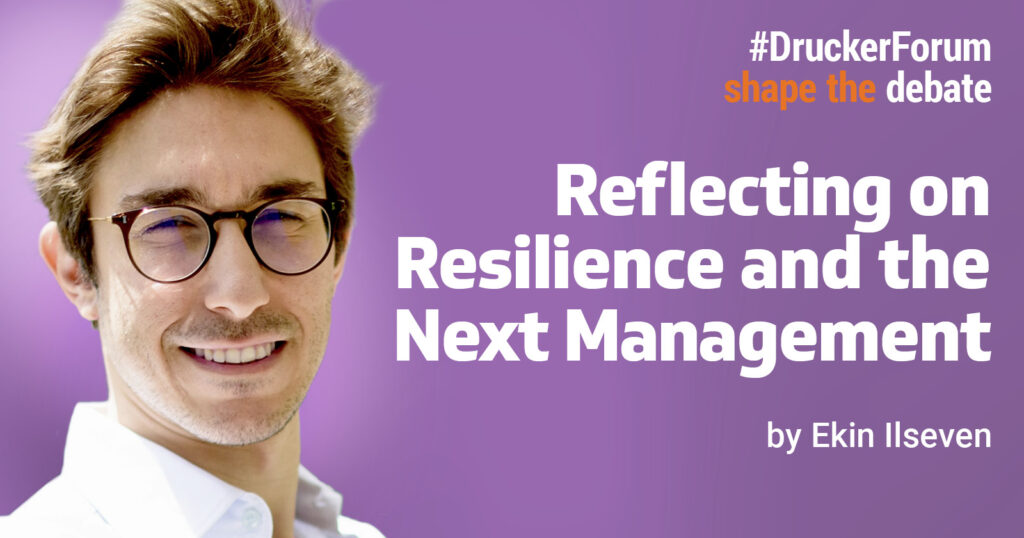
In the late afternoon of December 1, 2023, in the Hofburg Palace of Vienna, the Global Peter Drucker Forum committed itself to the pursuit of a new management paradigm, “The Next Management”, over the next five years. It came at the end of an eventful three-day Forum dedicated to Creativity and Resilience, where not only practicing or academic thought leaders, but also the younger generation and artists took the stage. Throughout the Forum, a consistent message echoed in the halls of the Hofburg Palace: “We can’t continue the way we have so far…”. In the midst of discussions triggered by the chaos and tsunami of change brought about by the global development and deployment of AI technologies, an important question emerged: channeling Peter Drucker himself, a forum panelist, Prof. Michael Kaschke, former president and CEO of Carl Zeiss AG and current chairman of the supervisory board of Karlsruhe Institute of Technology, asked, “What are the certainties we can hold on to?”
Among several important points discussed, looking back, I want to revisit and refresh our memory of one of them: that our social human nature makes us stronger together. It makes us resilient. Almost everyone agrees that in a phase of uncertainty, chaos, and transformation, the human component must take pride of place. Harvard Prof. Amy Edmondson School asserted that cultures that do not let the blame game flourish and create safety for learning from failure are essential for both individual well-being and organizations. Carla Arellana, partner at Greyhound Capital, highlighting the risk of individual autonomy turning into disorder, suggested that organizations with effective decision-making systems and consistent employee training, are the ones that endure.
INSEAD’s Prof. Yves Doz shared a striking yet not widely known story of the second surviving Fukushima power plant, Daini. Site superintendent Naohiro Masuda took active leadership on the ground, quickly assessing damage, identifying the effective yet costly solution, and most importantly “giving sense” to all employees involved in the crisis. As we discussed in our own panel, his feat resembled the leadership shown in the wake of the Great Lisbon Earthquake of 1755 by Marquês de Pombal, whose directives and engineering initiatives laid the foundation for today’s disaster responses and relief procedures.
Our advanced ability to develop and make use of technology by planning, predicting, and preparing relies heavily on our ability to cooperate and collaborate. In the face of micro- and macro-level changes, some of our own doing, we will always need to depend on each other to overcome such challenges. Put another way, the engine of society’s adaptive cycle that both creates and resolves chaos is fueled by our ability to remain together.
The “Next Management” includes a number of elements: innovation (ahead of efficiency), ecosystems (beyond the enterprise), societal enhancement (rather than narrow gains), technology augmenting (not automating) human creativity. The Forum added a complementing element: Balancing art and science. Kamilla Arku, the founder and director of Music for Liberia, and Paul Smith, the CEO of Voces8 Foundation, shared their experiences on how they brought together members of their community through music during the Coronavirus pandemic. In the pursuit of resilience, art and creativity act as social glue by making sense of crisis moments, creating a sense of solidarity, incorporating the events into our identity, all in all planting and nurturing the seeds for the next round of prosperity creation.
However, it is a call for a balance, not a division of labor and its allocation to art and science separately. It is often misunderstood how intertwined art and science are, both combining to fuel our human evolution. Working on subatomic particles called quarks, everyday particle physicists refer to James Joyce’s line from Finnegans Wake “Three quarks for Muster Mark!” The woodcut Circle Limit III created by M.C. Escher in 1959 depicts the hyperbolic geometry that lies at the heart of Einstein’s famous E=mc2 formula. The literary submovement OuLiPo (from French, “ouvroir de littérature potentielle”) aligns with advancements in combinatorics, algorithms, and knot theory in mathematics, leading to inspiring mathematical problems as well. Management science is increasingly bringing art into its studies, and we need to ensure it continues to do so.
As Drucker noted, organizations are tools for us to achieve more than what we could alone, and management is an organ developed by human society to fulfill a function, just like the heart circulating blood in our body. As reflected at the Forum, today there is a sense of heightened urgency about the challenges that face us at every level of the social system that we, ourselves, are a part of. As such, on our adaptive path of change and stability, chaos and order, innovation and production, we need to rethink what individuals can offer to organizations and their management. Doing this while embracing art and creativity will be essential if we are to become a resilient “we,” as individuals, organizations, and society.
With that, I look forward to welcoming you in September in Lisbon, home of the first yet still influential organizational responses and engineering solutions to natural disasters, as we advance on our path to the “Next Management” at the World Management Agility Forum.
About the author:
Dr. Ekin Ilseven is an assistant professor of strategy and organizations at Católica Lisbon SBE. He investigates strategic trade-offs underlying the achievement of organizational resilience through a lens of complexity theory along with intuition and methods developed in mathematics, physics, and computer science.

